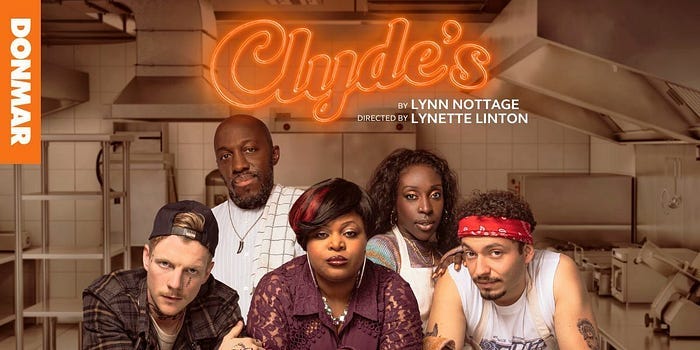Clyde’s, Donmar Warehouse, London
Character-driven drama about working class Americans with the rare features of hope, character development, optimism, new beginnings and positive change being possible, redemption and rehabilitation. And yet it didn’t move me as much as I thought it should have done — mostly I think is due to Clyde (as headlining character) remaining elusive and only seen through the words and eyes of others. We never really know what is motivating her (apart from what others suggest).
Giles Terera makes sandwiches to be savoured! This is not your typical drama. Clyde runs a truckers cafe staffed by former prisoners and cracks the whip to keep everyone in line. In between making orders, the team dream dreams, learn about each other and plan new menus and ways of being. Occasionally Clyde listens — but mostly not. In small glimpses we see a woman in deep despair — but we’re not sure why…
Real scene stealers are the other cast members. Ronkẹ Adékoluẹjo as a joyful, vulnerable lone parent dealing with an addict ex-partner and raising a daughter with complex needs lights up every scene she’s in. She also brings realism to her character, avoiding cliches and stereotypes.
Patrick Gibson’s Jason joins the tight-knit team as the newbie in the kitchen — he’s covered in white supremacist tattoos and heavy with attitude. Over time he learns to respect his diverse colleagues, the sandwich, the ingredients and himself. Rafael (Sebastian Orozco) is a Latinx romantic and wants to be clean. His moment of heartbreak and falling back into old habits is our heartbreak too.
Though very much in the background, Giles Terera as Montrellous is gentle, considered, sensitive and part walking wisdom and part father figure. He is the encourager, cheerleader and supporter for his colleagues, as well as wanting more — he plants a herb garden and gets Jason rhapsodising about adding garnishes. He brings everyone together through fantasy sandwich filling creations and it’s hard to work out what his real relationship to Clyde is. This air of mystery permeates the whole play.
Gbemisola Ikumelo plays the titular Clyde with gusto, emotional intelligence, ruthlessness and menace — her character is tough, strong and in trouble. Not afraid to employ dirty tactics, not to mention outright bulling, harassment and violence — Clyde keeps the kitchen cowed and squelches their dreams of luxurious sandwich filling, or doing things differently. Yet we do see her gentleness once as she offers to support Jason. More mythological than actual person, only at the end do any of her real feelings leak out and, alone, we see the pain she’s hiding and the stress she’s under. Rumoured to have killed her husband, we never know if the things she’s shares are outrageous stories designed to keep everyone in line — or truth. Just as she won’t accept a taste of any of the kitchen sandwich creations, she refuses and pushes off compliments and kindness.
In a brilliantly tense moment, Jason stands up to Clyde — and as audience, we have no idea where this is going to end. The kitchen sandwich ingredient rebellion is something too.
Lynn Nottage and Lynette Linton have made the potentially mundane magical with equally amazing set design. Frankie Bradshaw brings touches of magical realism to the stations by causing them to glow when characters create their sandwiches of dreams. Meanwhile, by having the stations on wheels, they can be moved into Busby Berkeley like musical formations, adding a dynamic element to the play. The kitchen can also be adapted fro music. All the time real sandwiches are created and nobly taken away from a serving hatch by an amazing unnamed team mate.
On the other hand, with the hair down, nose wiping and sitting on the serving counters, it is a wonder that the diner achieves its dream review in a local newspaper. Wholly, this is a play about people doing their best when life is really hard and all is against them — and the cast are stellar in delivering this. Although I would have liked more Clyde — we hear the other characters thoughts, dreams and ambitions from their own mouths, but Clyde remains a monstrous mystery — apart from in a couple of moments of terrible aloneness.



